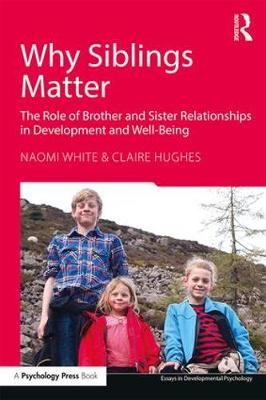Essays in Developmental Psychology
2 total works
Many people grow up with at least one sibling. These siblings are often ‘fellow travellers’ through adversity or significant life events; they can act as a source of support for some children while a source of conflict for others. For these reasons, siblings are a potentially powerful influence on development and this book is one of the first of its kind to provide an overview of cutting-edge psychological research on this important relationship.
Why Siblings Matter is a cornerstone text on siblinghood. Integrating findings from a 10 year longitudinal study alongside wider research, it provides a lifespan perspective examining the impact of sibling relationships on children’s development and well-being. This text situates siblings in their historical, developmental and family context, considers the influence of siblings on children’s development and adjustment, and provides an introduction to new research on siblings in diverse contexts. The authors discuss sibling relationships in varied populations such as siblings with disabilities, siblings in different cultures and siblings in non-traditional families, while also considering the practical implications of research.
Covering both classical studies and new results this book offers take-home messages for promoting positive sibling interactions. It will be invaluable reading for students and researchers in developmental psychology and family studies and professionals in education, health and social work.
Over the past thirty years, researchers have documented a remarkable growth in children's social understanding between toddlerhood and the early school years. However, it is still unclear why some children's awareness of others' thoughts and feelings lags so far behind that of their peers. Based on research that spans an extended developmental period, this book examines this question from both social and cognitive perspectives, and investigates the real-life significance of individual differences in theory of mind.
After tracing the key age-related changes in the development of theory of mind, this book examines individual differences in relation to children's cognitive abilities and their social experiences. Why might language or executive function matter for children's social understanding? And how do children's linguistic environments and relationships with parents and siblings contribute to their ability to reflect on people's thoughts and feelings?
The book also reviews the evidence for predictive links between early social understanding and later social behaviour. Using information gathered from classmates, teachers and the children themselves, the author investigates links between individual differences in early social understanding and in the quality of children's interactions with friends, in their ability to resolve conflict, and in diverse aspects of school adjustment.
Drawing on rich observational data gathered in this extended longitudinal study, as well as skills acquired during her early experimental studies of children with autism and a six year collaboration with Professor Judy Dunn, the author integrates both cognitive and social accounts of theory of mind. The book is ideal reading for researchers actively working in the field, graduate and undergraduate students specializing in developmental psychology, educational and health professionals, and parents interested in learning about children's early social development.

